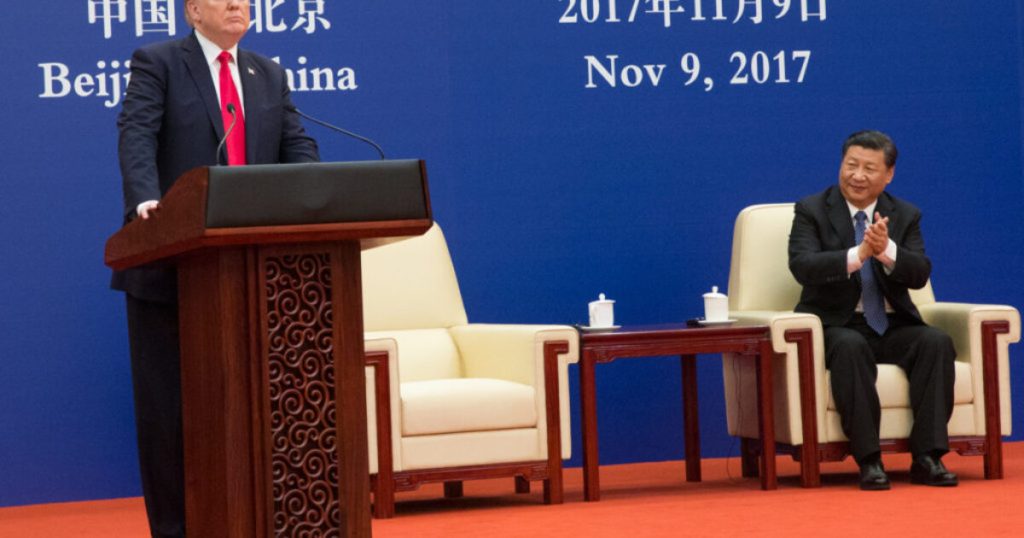President Donald J. Trump participates in a business event with President Xi Jinping at the Great Hall of the People, Thursday, November 9, 2017, in Beijing, People’s Republic of China. (Official White House Photo by Shealah Craighead) Photo courtesy of Trump White House Archive.
According to Bloomberg, China prefers Kamala Harris over Donald Trump, a sentiment echoed by Professor Jia Qingguo, of Peking University, an advisor to the Chinese Communist Party (CCP). This preference alone demonstrates that Trump’s China policy is tougher on Beijing and better for America.
The Chinese Communist Party (CCP) represents the greatest threat to America since the fall of the Soviet Union. Beijing seeks to dismantle the U.S.-led liberal international order and replace it with a China-centered authoritarian regime that fulfills Xi Jinping’s vision of the “great rejuvenation of China.” This global dominance would be enforced through military coercion and advanced surveillance technology. Xi aims to extend the high-tech surveillance state he has built in China, which is the most sophisticated in the world, to other countries, consolidating control on a global scale.
China’s recent actions, including surrounding Taiwan with a record 125 warplanes during large-scale military exercises and reports of potential drone incursions near U.S. national security facilities, underscore its increasing aggression. While the Biden-Harris administration responded with a statement urging restraint, it took no concrete action, as seen in its response to previous incidents like the Chinese spy balloon. The administration’s strategy of “managing competition” with China without taking more decisive action has emboldened the Chinese Communist Party (CCP).
Over the past four years, Xi Jinping and the CCP have capitalized on the weakness of the Biden-Harris administration’s approach. From imposing sanctions on U.S. officials during Biden’s inauguration to China’s continued human rights abuses being overlooked by international bodies, the administration’s diplomatic efforts, including re-engaging with the UN Human Rights Council, have failed to hold China accountable. Additionally, during a 2021 U.S.-China meeting in Alaska, Chinese diplomats publicly berated American officials, yet diplomatic relations have continued without significant repercussions for China. This series of perceived missteps has strengthened China’s position at the expense of U.S. security.
Trump was tough on China and is expected to take an even harder stance if reelected. In contrast, Biden and Harris have adopted a softer approach, focusing on cooperation and appeasement rather than containment. Their administration has failed to remove China from critical U.S. supply chains, halt American investments in Chinese companies, or effectively address the widespread espionage carried out by PRC students, researchers, illegal immigrants, and other civilians in the U.S. who act as agents for the CCP.
Despite their emphasis on diplomacy and collaboration, and their criticism of Trump, Biden and Harris have failed to build an effective coalition against China. While the U.S. is spending hundreds of billions on defense to protect itself from China, many U.S. allies continue to trade and invest with Beijing, indirectly funding the People’s Liberation Army (PLA), which regularly conducts war simulations against the U.S.
Unfortunately, it’s not just foreign companies but also American businesses and investors who continue to purchase Chinese products and invest in China. The Biden-Harris administration could impose a moratorium on U.S. investment in China and raise tariffs to 100% to deter the purchase of Chinese goods, while also discouraging U.S. allies from manufacturing in China and exporting to the U.S. However, they have yet to take these steps.
Democrats and the liberal mainstream media criticized Trump’s trade war with China during his first term, yet they kept his tariffs and restrictions in place while even adding to them. At the same time, they continued trading with China, cooperating with Beijing, and allowing Chinese agents to infiltrate U.S. educational institutions, civic organizations, and even government sectors.
A Kamala-Walz presidency would be even worse. Tim Walz has already stated that if Donald Trump had accompanied him on his many trips to China, he would realize he’s wrong about the PRC. However, there’s nothing to be wrong about. The U.S. intelligence community, including the FBI, Homeland Security, The Select Committee on the CCP, and the Department of Defense all recognize China as the greatest threat to the U.S. If Walz believes they are all mistaken, does that mean he would ignore their warnings and further open the country to the Chinese Communist Party?
The Biden-Harris administration has consistently employed a misguided strategy of appeasement to avoid a cold war with China, failing to recognize that the U.S. and China are already in one. A cold war is characterized by economic and diplomatic competition, espionage, low-intensity military conflicts, and proxy wars—everything short of full-scale war. This precisely describes the current U.S.-China relationship. Each time Biden and Harris speak of mending ties with China, they miss the point: the relationship is beyond repair. China aims to displace the U.S. and dominate the world, while America and most other nations oppose this vision. China’s axis of support includes fewer than ten nations willing to live in a China-led world, leaving no room for compromise. The U.S. must adopt a tougher stance on China, and Trump has promised to deliver exactly that.
The post China Prefers Kamala: Trump’s China Policy is Better for America appeared first on The Gateway Pundit.





